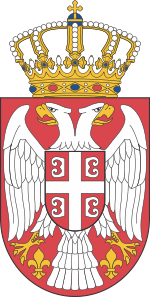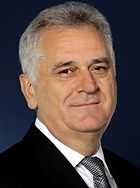Serbian parliamentary election, 2003
| | |||||||||||||||||||||||||||||||||||||||||||||||||||||||||||||||||||||||||||||||||||||||||||||||||||
| |||||||||||||||||||||||||||||||||||||||||||||||||||||||||||||||||||||||||||||||||||||||||||||||||||
| |||||||||||||||||||||||||||||||||||||||||||||||||||||||||||||||||||||||||||||||||||||||||||||||||||
| |||||||||||||||||||||||||||||||||||||||||||||||||||||||||||||||||||||||||||||||||||||||||||||||||||
 |
| This article is part of a series on the politics and government of Serbia |
|
Legislature
|
|
Judiciary |
|
Politics portal |
The Serbian parliamentary election, 2003 was held on 28 December 2003 to elect members of the National Assembly.[2] Serbia was one of the two federal units of Serbia and Montenegro, formerly known as the Federal Republic of Yugoslavia.
Serbia had been in a state of political crisis since the overthrow of the post-communist ruler, Slobodan Milošević, in 2001. The reformers, led by former Yugoslav President Vojislav Koštunica, have been unable to gain control of the Serbian presidency because three successive presidential elections have failed to produce the required 50% turnout. The assassination in March 2003 of reformist Prime Minister, Zoran Đinđić was a major setback.
At these elections the former reformist alliance, the Democratic Opposition of Serbia (DOS), had broken up into three parts: Koštunica's Democratic Party of Serbia, late Prime Minister Đinđić's Democratic Party (now led by Boris Tadić) and the G17 Plus group of liberal economists led by Miroljub Labus.
Opposing them were the nationalist Serbian Radical Party of Vojislav Šešelj and Milošević's Socialist Party of Serbia (descended from the former Communist Party). At the time of the election, both Šešelj and Milošević were in detention at ICTY, Milošević accused of committing war crimes, Šešelj of inspiring them.
The remaining candidate was the monarchist Serbian Renewal Movement-New Serbia (SPO-NS) coalition, led by Vuk Drašković.
Results
| Party | Votes | % | Seats | +/– |
|---|---|---|---|---|
| Serbian Radical Party | 1,056,256 | 27.62 | 82 | +59 |
Democratic Party of Serbia
|
678,031 | 17.73 | 53 | +8 |
Democratic Party
|
481,249 | 12.58 | 37 | -25 |
| G17 Plus | 438,422 | 11.46 | 34 | +34 |
| Serbian Renewal Movement–New Serbia | 293,082 | 7.66 | 22 | +14 |
| Socialist Party of Serbia | 291,341 | 7.62 | 22 | -15 |
Together for Tolerance
|
161,765 | 4.23 | 0 | -19 |
| Democratic Alternative | 84,463 | 2.21 | 0 | –6 |
For National Unity
|
68,537 | 1.79 | 0 | –10 |
| Otpor! | 62,545 | 1.64 | 0 | 0 |
Independent Serbia
|
45,211 | 1.18 | 0 | –7 |
| Socialist People's Party | 27,596 | 0.72 | 0 | 0 |
| Liberals of Serbia | 22,852 | 0.60 | 0 | – |
| Reformists – of the Social Democratic Party of Vojvodina – of Serbia | 19,464 | 0.51 | 0 | –4 |
Defense and Justice
|
18,423 | 0.48 | 0 | –9 |
| Business Potential of Serbia and the Diaspora | 14,113 | 0.37 | 0 | – |
| Labour Party of Serbia | 4,666 | 0.12 | 0 | – |
| Yugoslav Left | 3,771 | 0.10 | 0 | – |
| Alliance of Serbs of Vojvodina | 3,015 | 0.08 | 0 | – |
| Invalid/blank votes | 49,755 | 1,30 | – | – |
| Total | 3,824,557 | 100 | 250 | 0 |
| Registered voters/turnout | 6,511,450 | 58.7 | – | – |
| Source: Nohlen & Stöver | ||||
Seats

References
- ↑ Nikolić was the de facto leader whilst Vojislav Šešelj was at the International Criminal Tribunal for the former Yugoslavia
- ↑ Nohlen, D & Stöver, P (2010) Elections in Europe: A data handbook, p1715 ISBN 978-3-8329-5609-7
| ||||||||||||||||||||||||||




